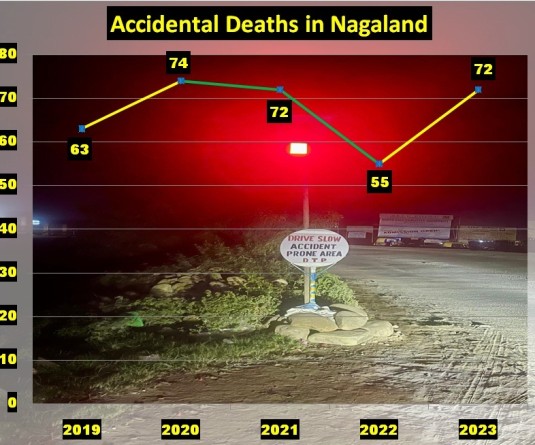
Kohima, May 30 (MExN): The Nagaland Government gained a breakthrough in the prolonged litigation relating to the Nagaland House at Shakespeare Sarani, Kolkata, an official release informed.
As per release issued via the State DIPR, the Calcutta High Court on its order passed on May 6, 2022, has directed the case to be referred to arbitration and an Arbitrator was appointed.
Even after the order was passed, the Civil Engineers Enterprises Pvt. Ltd. (CEEPL), the opposing party to the case, attempted to get a stay of the suit of Nagaland and the same was opposed on the ground that the High Court has got no jurisdiction to decide this matter anymore as the matter has been referred to arbitration, it said.
The State Government would move appropriate applications before the arbitrator for joint trial of both the cases on the ground confirmed by the High Court itself that the cases are between the same parties and the fact and law involved are the same, it added.
It further noted that the lessee did not allow the officials of the State to inspect the lease premises, nor did they furnish details of the sent deeds/taxes etc.
Application has been filed in the Court for direction to the lessee to disclose these facts to ascertain whether they have sold any part of the premises, the State Government further informed.
The CEEPL also attempted to refer the case for mediation on the last hearing which was again rejected by the Court.
The Court, as per the release, reportedly observed that “you are paying a paltry amount of Rs 5 lakh per month in such a posh locality in Calcutta and therefore, you are not entitled to relief of mediation.”
The purpose of seeking mediation was only to put the case in cold storage, the State Government maintained.
By virtue of these orders, the State of Nagaland is in a more advantageous position, added the release, attributing the breakthrough to the dedicated and sustained efforts of the counsels for the State-led by KN Balgopal Advocate General, assisted by Advocate Nitya Nambiar and Vitso Rio.
Hopefully, the State Government will be able to get a favorable judgment against an entity that is trying to exploit some loopholes in the law to pay a paltry sum as rent, it added.
Background of the case
As per the release, on December 24, 1997, the State of Nagaland executed a lease deed with CEEPL concerning premises no. 11 Shakespeare Sarani, Calcutta for 20 years.
Located in the heart of Kolkata, the lease deed was to commence on January 1, 1998 and end on December 31, 2017. The total area rented was 1,05,000 sq. ft.
As per clause 3 of the lease deed, the rent per annum was fixed at Rs 5 lakh per month or Rs 60 lakh per annum, rent was fixed following the West Bengal Premises Tenancy (WBPT) Act, 1997, and rules.
Under clause 2.1 of the said lease deed, the tenant was entitled to renew the lease deed by another 20 years subject to the enhancement of rent in terms of the West Bengal Premises Tenancy Act, 1997 (amended).
There was a further clause that after the expiry of the second term the lessor i.e. the State of Nagaland shall renew the lease in favor of the lessee i.e. CEEPL for a further period subject to enhancement as per the market value as mentioned in the second schedule, the release informed.
The State of Nagaland is the owner of the Nagaland House commercial complex located at Premises no. 11 Shakespeare Sarani, Calcutta, and it included many buildings including the 10-floor Nightingale hospital.
However, the Act does not cover premises owned by the central or the state government and any premises let out for non-residential purposes which carries more than Rs 10,000 as monthly rent, it added.
Accordingly, on the expiry of the lease deed on December 31, 2017, the tenant once again approached the government for renewal of the lease deed on the condition that the rent will be paid only as per the WBPT Act, 1997.
On the other hand, the State of Nagaland issued notices to the tenant seeking payment of Rs 2.2 crore per month as rent and refused to accept the fixation of rent on basis WBPT Act on the ground that the State and Central Government properties are exempted from the Act.
The State Government further said that some of the “salient one-sided features of the lease” provided that the tenant: entitled to sublet the premises to third parties on terms mentioned in the lease deed; entitled to mortgage the property of Government of Nagaland; could take loans by using this property as collateral security; and 1500 sq. ft. free of cost for the entire lease period.
In effect the lease deed looked more like a sale deed because the lessee had supreme rights over the property, and when notice was issued the State Government that the lease is terminated by “efflux of time for not paying enhanced rent,” the lessee filed civil suit in Calcutta High Court seeking the relief of specific performance of the lease deed dated December 24, 1997.
It pertained to a renewal clause of payment of the rent in terms of the WBPT Tenancy Act which the State Government refused to accept, the release added.
However, contending that one cannot enforce an illegal agreement or an agreement against public policy or public interest according to law, the State of Nagaland also filed a suit for possession and damages.
Thereafter, the CEEPL obtained a stay against the suit filed by Nagaland on the ground that if “one suit has been filed and consequent to that another suit has been filed by the opposite party the first suit filed by the lessee shall take precedence.”
This stay was for 2 months after which the stay automatically stood vacated, the State government informed.
At the instance of the Chief Minister around 5 MLAs/Advisors who were part of a committee attended the hearing in the Calcutta HC, it said.
As there was a possibility of the State of Nagaland being drawn into lengthy litigation, and as both the suits are between the same parties based on the same facts and law it was decided to refer the cases from the High Court to Arbitration resulting in the breakthrough, indicated the release.






